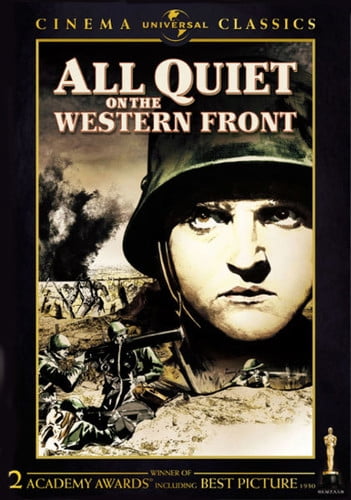

“It’s a 1930 film, and a lot of 1930 films are awkward where the camera doesn’t move very much,” says Joseph McBride, a film historian and professor at San Francisco State’s School of Cinema.

But it is bold in many respects, starting with the unusually fluid camera work, rare for the early sound era. The 1930 “All Quiet” is a Hollywood movie, with American actors playing German soldiers this was the standard of the time. Still, these movies were made 92 years apart from each other, in different countries and different film industries. (There is also a 1979 TV movie adaptation, directed by Delbert Mann and starring Richard Thomas and Ernest Borgnine.) Both films depict war as something old men send young men off to die in, though the new film leans into this idea more forcefully and to more chilling effect.

Both films capture the sheer horror of trench warfare, and up-close deployment of new weapons, such as mustard gas. Both follow Paul (Lew Ayres in the 1930 film, Felix Kammerer in the new version), a young German soldier who has the idealism pounded out of him by what he experiences and witnesses on the battlefield. Indeed, the two films are similar in many specifics. I had to take a breath and put it away and just think about it for a moment and find my own way into it again and just say, ‘No, this is our very subjective interpretation of that story.’” “But when I watched it, I realized the screenwriters had read the same scenes and sometimes used the same scenes that I was using in my screenplay. “I love that film,” Berger said in a recent video call from Rome, where he’s shooting his next movie. But as he watched that film in preparation for his own, he still felt the anxiety of influence. His film is based on Erich Maria Remarque’s 1929 novel, not the 1930 film. Just ask Edward Berger, the director of the new German adaptation of “All Quiet,” which garnered nine Oscar nominations, including one for best picture. Still widely considered one of the best war movies ever made, Milestone’s film casts a long shadow. Banned in multiple countries, including Germany, Lewis Milestone’s epic World War I film still stands as a blunt antiwar powerhouse, showing the carnage and futility of the Great War as seen through the eyes of young German soldiers (played by American actors) sold on the promise of heroism before the horrible reality of battle knocks them back down to earth and, in most cases, into the grave. The original “All Quiet on the Western Front,” released in 1930, was the third-ever Oscar best picture winner.


 0 kommentar(er)
0 kommentar(er)
